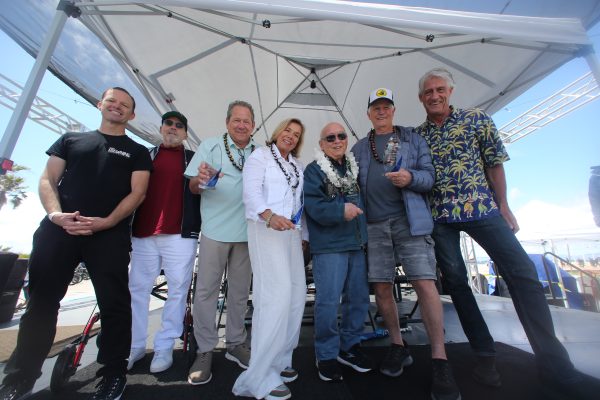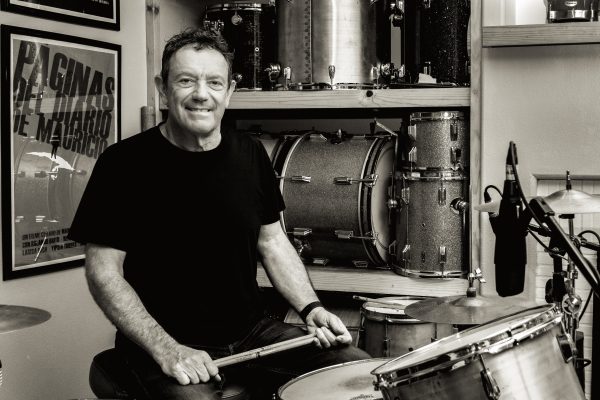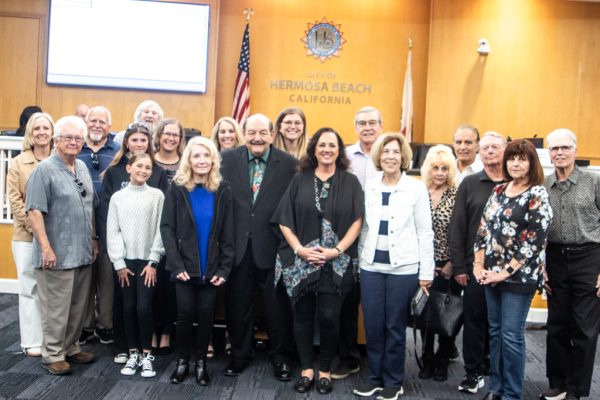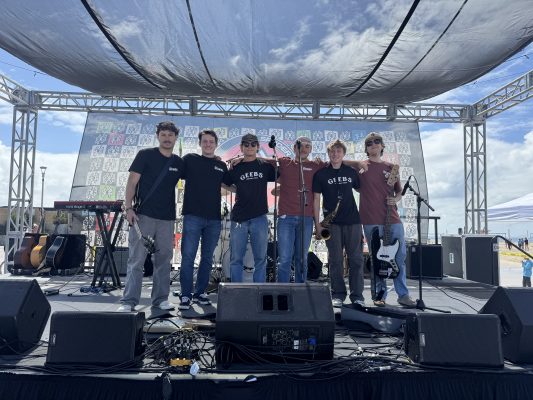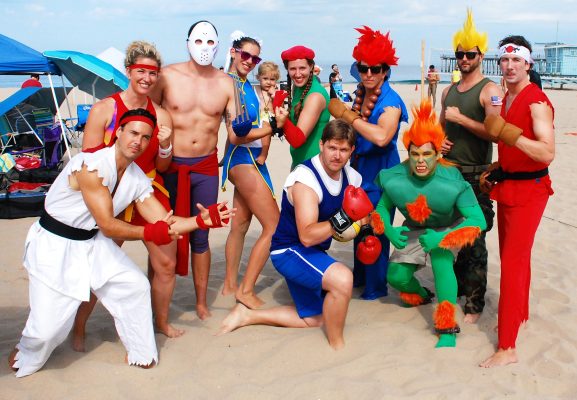Off the beaten path
Jim Lindberg sounds off on his solo album, “Songs from the Elkhorn Trail”
by Bondo Wyszpolski
Pennywise singer and songwriter Jim Lindberg needs little or no introduction, since the band (with Fletcher Dragge, Randy Bradbury, and Byron McMackin) has been a hard-rocking local—and national—sensation since the 1990s. On his just released solo album Lindberg displays a versatility, a vulnerability and compassion, that may surprise some of the group’s long-time fans. As they say at the ice cream parlor, Here’s the scoop.
Easy Reader: One of the first thoughts I have is that this is quite a departure from what we might expect from a member of Pennywise. Had the idea of a solo album been percolating within you for a long time?
Jim Lindberg: “Ever since I got my first guitar I’ve been writing my own songs. The track called ‘The Basement’ on this album I wrote when I was 15 years old. I was in various bands in high school and college and was writing songs with them, and when Pennywise started up, I started adapting to the style of music Jason (Thirsk) and Fletcher were writing, but I was still working on all kinds of different music on my own. Some I knew could be good Pennywise songs, but others I knew they wouldn’t touch in a thousand years. I have boxes and boxes of 4-track tapes of garage demos. I knew early on that people would like some of the songs and some wouldn’t. Instead of worrying about it too much, I just start writing the next one.”
ER: Starting with the title, “Songs from the Elkhorn Trail,” there’s a sense we’re in for something different (and in some ways I think of John Doe, for example, going off and making albums that bear little resemblance to what he does with X). How should your fan-base read it with regards to ongoing work with Pennywise?
Lindberg: “I’m a huge fan of X and to me they’ve always had a more Americana base to their music, so to see John Doe doing his more country-sounding stuff was always a huge inspiration to me because you get to see the roots of his songwriting. So hopefully it’s the same way with our fans. You get to see the other influences besides Black Flag and the Ramones. Being from the South Bay, the Beach Boys’ ‘Endless Summer’ was like a soundtrack to my youth and that’s where the sense of melody comes in; and then my dad listened to singer-songwriters like Harry Chapin and Roger Miller, and country artists like Waylon Jennings and George Jones, so I can hear that influence in some of these songs.
“I’ve always thought some of the best punk rock songs, like ‘Sorrow’ and ‘Man With A Mission’ by Bad Religion, and ‘Story of Life’ and ‘Ball and Chain’ by Social Distortion, sounded like Hank Williams’ country songs with a little more distortion and adrenaline. It’s all roots music.”
ER: “Songs from the Elkhorn Trail” contains both recent and far older songs. Were many of these originally written for, or presented to, Pennywise? (Clearly, many of them would not fit into the Pennywise “template”).
Lindberg: “I think within the first twenty seconds of writing a song I know whether it could become a Pennywise song or not. Maybe even before I pick up the guitar. While I’m still expressing my own ideas and views about the world, our songs are meant to be more inspirational, fist in the air anthems with some well-intentioned cultural and political satire. With this album it was a lot more personal and reflective. One of my favorite band names is HFL: Hard, Fast, Loud. I considered calling this album the opposite: ‘Soft, Slow, Quiet.’ That definitely doesn’t fit into the Pennywise template if there is one.”
ER: COVID mandates and restrictions have been with us going on two years. In your case, restricting live performances. How much of the record came out of this period with the band largely on hiatus?
Lindberg: “Four of the twelve songs I wrote after Covid, when I’d go out to the desert to get away from all the noise and static and just write. It’s so peaceful and quiet out there, and I could turn off the phone and the emails and the news and everything else and just get away from it all for a few days. There was just absolute chaos going on in the world. The desert was my escape.”
ER: As for the record itself, it seems somewhat confessional in places, largely introspective, and even displays a great deal of vulnerability. In your notes for “I Feel Like The Sun,” you write: “It’s also about getting older and riding off into the sunset.” That sentiment, variously expressed, crops up in a couple of the other songs. Aren’t artists/bands that are considered “punk rock” not supposed to write about such things?

Lindberg: “I think there’s always been a fair amount of sneering attitude and antagonism to punk rock and that’s what drew us to it. It was the sonic equivalent of talking back to your parents or the teacher. It sounded like getting into trouble. Some of the better punk bands started to improve on that initial burst of angst and started confronting some of the problems they saw going on in the world and speaking out about it. That was something that always made me proud about the genre. It’s good to keep that youthful fire inside, and we’ve tried to do that, but it becomes tempered by reality. Eventually you grow up, maybe have some kids, get some rent or a mortgage, and it’s hard not to become reflective at a certain age and look back at what it all means and how it affected you, everything you’ve been through.
“There’s an old quote that says something to the effect of, ‘Anyone who isn’t an idealist at age twenty doesn’t have a heart. Anyone who still is one at forty doesn’t have a mind.’ I hope we try to stretch that out a bit and keep a little bit of both intact for as long as we can.”
ER: In some ways, I feel that “Songs from the Elkhorn” trail is a transition album, maybe encapsulating both your songwriting past and your songwriting future. For example, “The Palm of Your Hand” eschews the frantic pace of most Pennywise songs, but it doesn’t lose its sense of urgency. It’s both catchy and I think accessible to a larger audience. On the other hand it contains “remnants” of the “shout-along skate punk anthems” (quoting the press notes) that worked well-enough with Pennywise but can seem out of place here. So I guess I should ask you: Do you see this as a transition album or just a one-off side project?
Lindberg: “I have so many songs, and my family and friends have been after me to put them out for a while now; and so I was finally able to get Ted Hutt the producer into the studio with me because I knew he would be the one to help me make this first album. I definitely want to keep doing more acoustic songs and several of people’s favorite ones were left off this album because they didn’t fit the overall themes of the record, but it’s not a transition away from Pennywise. It’s just a cool outlet outside of that world, just like Wraths or The Black Pacific. It’s good to have other ways to express yourself. You never know who will connect with what.”
ER: “I Feel Like The Sun” is purportedly the last song you wrote for this album. It seems partly autobiographical: What were you thinking/feeling when you wrote it? Angst? Defensiveness? Frustration? That aside, the trumpet work of Glen Marhovka adds a nice dimension to the song.
Lindberg: “Those terms would probably be accurate. That’s another one I wrote in the desert all at once. I actually recorded it right to my phone. I wrote it from the perspective of someone or something, in this case, the sun, that was always getting blamed for everything when you’re just kind of cruising along doing your own thing. It’s a kiss-off song at heart. Go scream at a wall. It’ll make the same difference as blaming me for all your issues.
“I knew right away what I wanted the horn section in the chorus part to sound like, so when Glen came in we worked on piecing together the solo part from different takes and it suddenly became this beautiful Chet Baker style solo and took the song to a whole new direction. It has this Don Quixote ‘Spanish Bombs’ by the Clash vibe now and it’s probably my favorite song on the record.”
ER: “You’re Not Alone” urges people not to give up hope, to pull themselves together and move on from toxic relationships of whatever kind. Sometimes, I think, far easier said than done. The vocals during the repeated lines “All you know is suffering/ Your whole life’s full of misery” sound like they’re being sung by Graham Parker, that same kind of edginess. I know these aren’t your primary influences, but did the work of, let’s say, Parker, Joe Jackson, Elvis Costello, etc, have any bearing on your songwriting?
Lindberg: “I distinctly remember wearing out the grooves of Joe Jackson’s ‘Look Sharp’ and ‘I’m the Man,’ and ‘My Aim is True’ and ‘This Year’s Model’ by Elvis Costello in my basement bedroom, and immediately relating to the lyric style and the attitude and melody. We played cover songs from all of those albums in my high school cover bands. Graham Parker fits in that mold as well. The line between what would be called a ‘punk’ band like The Damned and a ‘new wave’ artist like Joe Jackson was always incredibly thin to me. It was all these ‘weirdos’ and outcasts and misfits who defied categorization having their revenge artistically. It’s Men At Work and Billy Bragg, too, and Keith Morris for that matter. It’s a middle finger to the big popularity contest, beauty pageant, coolness competition, class war that goes on in every town from high school all the way into the old-folks home. It was really fun at the same time.
“People were free to be a lot more experimental and just plain weird back then. Could a band like Devo or The B-52’s come out and succeed today? I doubt it. We were lucky to live in a time when more people had the courage to be crazy and weird without having to worry about being dragged across the internet for it. It seems there’s only a few artists these days—St. Vincent, Grimes, Die Antwoord—that are willing to fly the freak flag proudly today. They have the courage to do it.”
ER: “Don’t Lay Me Down” is probably the most moving or heartfelt song on the album, especially if one knows the backstory—witnessing the mental and/or physical decline of a parent. There’s not much that’s sadder. When I listened to this song I said aloud, “Ah, Jim! You’re not a punk rocker anymore!” You really can’t write the same songs at 50 or whatever that you wrote at 20, can you?
Lindberg: “It’s different for everyone, but the grieving process for losing a parent is a milestone I don’t think a lot of people are prepared for. It’s like a freight train headed straight for you that you know is coming but you’re never quite ready for. My dad was such a fun-loving guy and so supportive of me. I don’t think anyone in our family wanted to believe it was happening, so when it did, it hit us hard. Two years later, I drove out to the desert, immediately sat down and wrote ‘Don’t Lay Me Down’ all at once, just crying like a baby. I think the pandemic finally made me sit down and confront it and deal with it. It’s impossible to go through that and not examine your own mortality. We’ll all be riding off into the sunset at some point.”

ER: What about “Blood On Your Hands”? One wonders how autobiographical this is, especially with the “When you look in the mirror” stanza.
Lindberg: “I wanted to call that song ‘Note to Self.’ The telling line in the song is, ‘Just give up/The Blood it will soon wash away.’ Sometimes you have to be your own therapist. Some of the Pennywise songs I wrote certain friends would criticize as being too preachy, but I was preaching to myself a lot of the time—not to let resentment, worry or regret eat you alive. These are hard lessons to learn. There’s other baggage you carry around with you your whole life like a lead blanket, the only way to get rid of it is to ‘let that ego drop’ and forgive yourself and others. Otherwise it will just continue to weigh you down.”
ER: Some of the songs at the end seem to move back and forth between accepting what we’ve become, the unstoppable cycle of life, and so on, and showing one’s fighting spirit and defiance. Maybe you can comment on this, but here’s what I mean: “It’s Only” ends with “We only build our dreams big enough to fall/ We’re only human after all.” This song is followed by “On Fire” with its “You can’t keep me down” and its “I’ll set this world on fire”—almost like an ode to defiance. Maybe it’s aimed at one’s younger self? Or, conversely, a pep talk for one’s older self to keep fighting the fight? And then again, we segue into “Long Way To Go” which is reminiscent of “Don’t Lay Me Down” in that it’s wistful (and veers close to signaling a resignation of sorts).
Lindberg: “‘On Fire’ was definitely a pep talk aimed at my younger self. I had an eye condition from birth and I always tended to act out to try to distract attention away from it. I think that had a lot to do with how I turned out because I feel like I could have either withdrawn or fought back against being treated differently or unworthy. That song to me is like going back to that young defiant kid and going arm and arm together into battle, a total ‘Burn your bridges before they burn you’ song. Then there are songs like ‘Long Way to Go’ that I wrote years ago after my grandmother died, and she had a very hard life with lots of tragedy, but also some nice memories as well. Unlike my dad, I think she was ready to go when she passed away and so that song is kind of like me holding her hand and guiding her into it and making peace with it. I like that the album ends on that note. It’s a hopeful resignation. So the album isn’t linear from beginning to end. It goes from defiant, to somber, to resigned and ultimately hopeful. It’s kind of all over the place. Like life. Sometimes you want to jump in the race, other times you want to sit on the sidelines and be thankful you didn’t get run over.”
ER: I haven’t touched on all the songs, but my take is that this record explores and expresses feelings that could only have been stated on a personal project and not necessarily in a group project. From where you are today, at the very end of 2021 and far from the early days of Pennywise, what direction musically do you wish to move into? Do you think the reception of “Songs from the Elkhorn Trail” will influence your evolution, and do you intend to keep on that Elkhorn Trail regardless of what others think?
Lindberg: “I think I’m past the age where I’m hopeful of a smash hit song on the radio, but I do like the idea of recording more of these songs just for myself and my family and anyone else who would like to hear them. I’ve been getting a different response from fellow musicians and critics and friends to this album. I think people my age can relate to it a little bit more than the next song I write suggesting that people should be wary of corrupt politicians and corporations, although I have no problem writing more of those. There’s more fodder than ever for that. It’s good therapy for me to get all these songs out, whether I’m screaming into a microphone or playing a slow, sad song on an acoustic guitar.”
Jim Lindberg’s Songs from the Elkhorn Trail was released digitally last month, but the physical CD and vinyl album (with art by local artist Bob Dob) won’t be in stores until May 1. ER


